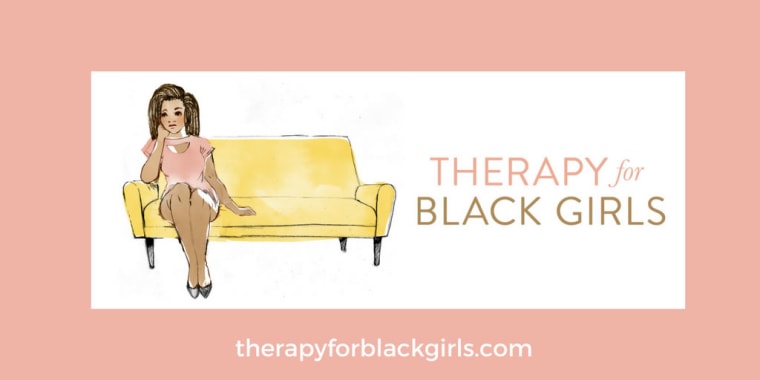Addressing mental illness within the African-American community has, at times, been a taboo topic. Yet, it is a medical condition that impacts every day life and should not be ignored.
The Office of Minority Health of the Department of Health and Human Services reports African-Americans are more likely to report having serious psychological distress than Non-Hispanic whites. Depression, Post-Traumatic Stress Disorder (PTSD), Attention Deficit Hyperactivity Disorder, and suicide are few mental health conditions African-Americans suffer from. Trauma, genetics, and environmental factors such as poverty and homelessness are some of the causes of mental illiness among black people.
Dr. Joy Harden Bradford, licensed psychologist and Founder of Therapy for Black Girls has been in the practice of mental health for eight years. After watching "Black Girls Rock" on BET in 2014, she was inspired to "capture some of that same energy in a space related to mental health" by creating a website that makes "mental health topics accessible and relevant to Black women."
She spoke with us about confronting mental illness head-on, confronting stigmas related to treatment, and the intersection of the Black Church and mental healing.

[This interview has been edited and condensed for clarity]
NBCBLK: How can we recognize signs of mental illness in others? Is it possible to recognize those signs within our selves? What would one look for in terms of signs and symptoms or marked changes in behavior?
Bradford: Typically, what you would be looking for in terms of signs and symptoms are marked changes in behavior. For example, someone becoming way less social than they used to be, someone drinking a lot more than they used to, someone who is usually dressed impeccably looking more disheveled. It is definitely possible to recognize symptoms within ourselves, again by paying attention to changes in our behaviors that are causing impairments in major areas of our lives.
What does treatment entail?
Treatment for a mental illness can involve a lot of different things. It could be talk therapy alone. It could be talk therapy combined with psychiatric medication. It could involve being hospitalized for some time to stabilize symptoms. It could involve an intensive outpatient program. It could be group therapy. It could look very different depending on what symptoms someone is presenting with and the recommendation of the provider.
Why does our community view treatment as something only “white people do?”
Historically, therapy and other treatment for mental health has been very White. I think we are doing a much better job currently of normalizing therapy. I also think that some of this is related to Black people not wanting to be seen as entitled or selfish. Focusing on self can sometimes be seen as a bad thing and we have not historically been taught that it is okay to focus on ourselves, particularly Black women.
Many Blacks rely on their faith and family for guidance during trying times. Can we pray away mental illness?
You cannot pray away mental illness just like you cannot pray away a broken leg. Faith and family can serve as a tremendous support to help in treating a mental illness but it cannot be the only thing. If faith is something that is important to you, then by all means continue to be a part of your faith community and receive that support. But we get into trouble when we see mental illness as a breakdown in faith or as the consequence of a supposed “sin.” That is not accurate and can be terribly damaging to someone who is struggling with a mental illness.
Discuss the stigma around treatment for mental health.
Culturally, there is a long history of observing the rule, “What goes on in this house stays in this house.” I think that because African-Americans have had to be so careful and suspicious about how information is taken and used against us, we have developed coping strategies that in the past kept us alive but currently no longer serve us. I think that many people still see mental illness as a personal failure as opposed to a medical condition and that makes people embarrassed to share they are struggling.
One stigma around mental illness is that a person will have to take pills or seek treatment forever. Is this true?
Decisions about the course of treatment rely a lot on the diagnosis and the collection of symptoms you present with. Some diagnoses may require taking medication for the rest of a person’s life but I always encourage people to think about those who need insulin to maintain their health after a diagnosis of diabetes. We don’t typically look at someone weird or hear much fuss related to needing insulin, so someone who may need a psychiatric medication to maintain their health and manage symptoms should be seen similarly.
"You cannot pray away mental illness just like you cannot pray away a broken leg."
What are some of the barriers those who want to seek treatment face?
Cost is definitely a major barrier for a lot of people as it relates to treatment for mental health services, particularly if someone does not have insurance. However, most counties have mental health clinics and other facilities that offer treatment at a lower cost. Many African-Americans want to see a provider who is also African-American. While there are quite a few African-American mental health providers, there are not enough to meet the need that often arises.
How important is it for patients to have psychologists/therapists who look like them?
The research has been consistent in that the single most important factor in determining whether therapy will have a positive outcome is the strength of the relationship between client and therapist. So if this means finding a provider that looks like you, then definitely go for it. But I also think that it’s possible to have very positive outcomes from therapy even if your provider is not African-American.
In regard to racial bias, white mass-shooters seem to be quickly identified as "mentally ill" while mass-shooters with brown skin are labeled terrorists. Why do these labels matter, especially to the Black community?
They matter for a lot of different reasons. First, whenever mental illness is thrown around as a reason why these horrible tragedies occur, it serves to further stigmatize mental illness. Things like this are the reason why people are afraid to come forward and say they are struggling with a mental illness.
I think it also matters because when a Black or Brown person is the murderer, it is seen as an act that is reflective of an entire group. The media pays close attention to cultural pieces that they try to imply are related to the suspect's behavior. However, when the murderer is White, there is a rapid push of the "lone wolf" narrative. So this person does not reflect their larger culture, this was just the wrongdoing of one person.
